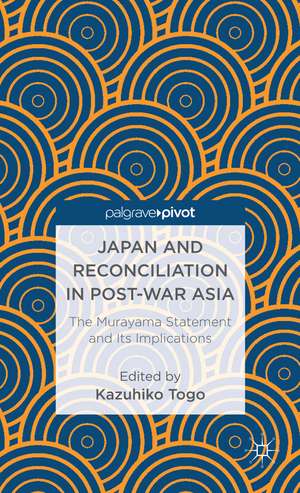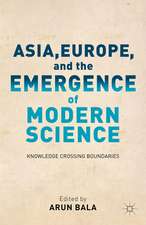Japan and Reconciliation in Post-war Asia: The Murayama Statement and Its Implications
Editat de K. Togo Contribuţii de Kenneth A. Loparoen Limba Engleză Hardback – 30 oct 2012
Preț: 483.39 lei
Nou
Puncte Express: 725
Preț estimativ în valută:
92.49€ • 96.92$ • 76.46£
92.49€ • 96.92$ • 76.46£
Carte tipărită la comandă
Livrare economică 11-25 aprilie
Preluare comenzi: 021 569.72.76
Specificații
ISBN-13: 9781137301222
ISBN-10: 1137301228
Pagini: 116
Ilustrații: XII, 116 p.
Dimensiuni: 140 x 216 x 11 mm
Greutate: 0.31 kg
Ediția:2013
Editura: Palgrave Macmillan US
Colecția Palgrave Pivot
Locul publicării:New York, United States
ISBN-10: 1137301228
Pagini: 116
Ilustrații: XII, 116 p.
Dimensiuni: 140 x 216 x 11 mm
Greutate: 0.31 kg
Ediția:2013
Editura: Palgrave Macmillan US
Colecția Palgrave Pivot
Locul publicării:New York, United States
Cuprins
Overview; Kazuhiko Togo Historical Role and Future Implications of the Murayama Statement: A View from Japan; Kazuhiko Togo Political Apology in Sino-Japanese Relations: The Murayama Statement and its Receptions in China; Daqing Yang In Search of the Perfect Apology: Korea's Responses to the Murayama Statement; Youngshik D. Bong Redeeming the Pariah, Redeeming the Past: Some Taiwanese Reflections on the Murayama Statement; Rwei-Ren Wu Neither Exemplary nor Irrelevant: Lessons for Asia from Europe's Struggle with its Difficult Past; Thomas U. Berger Notes on Contributors
Recenzii
'Hopelessness about Japan's reconciliation over history with its neighbors is best addressed not by wishful thinking but by refocusing on the Murayama Statement of 1995. This important apology was underappreciated by China and South Korea and also denounced by many Japanese conservatives. Yet, this carefully presented book shows that it is a genuine apology, which could serve as a building block for greater trust. Kazuhiko Togo combines diplomatic insight and scholarly analysis in his clear overview and balanced coverage of the view from Japan. The other authors follow a similar model in detailing the reception the Murayama Statement received. With the right range of topics, this book points to the statement's possible future implications. To realize them requires taking seriously the search for common ground, something unlikely to occur if the Murayama Statement continues to be dismissed. This book not only fills a gap in coverage of the critical decade for historical memory of the 1990s, but also serves as a wake-up call for those interested in understanding and altering the course of international relations in East Asia.' - Gilbert Rozman, Musgrave Professor of Sociology, Princeton University, USA
Notă biografică
THOMAS U. BERGER Associate professor, Department of International Relations, Boston University, USYOUNGSHIK D. BONG Senior research fellow and director of Foreign Policy Studies, Asian Institute for Policy Studies, Seoul, KoreaKAZUHIKO TOGO Director of the Institute for World Affairs and professor of International Politics, Kyoto Sangyo University, JapanRWEI-REN WU- Associate research fellow, Institute of Taiwan History, Academia Sinica, Taiwan DAQING YANG Associate professor of History and International Affairs, George Washington University, US
















